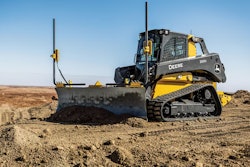
There was the one time he got a job in high school at Kroger that lasted all of a couple of weeks. “It was kind of hard to get hours at my other job during the winter, so I went to Kroger and got a job,” he recalls. “I just couldn’t stand working inside. Plus they had this two-sided mirror the manager watched all the employees from. That just pissed me off.”
Save for Kroger, Humerick’s career and life up until this point have been defined by uncompromising focus. And not just in the moment. He remembers things. Conversations, important decisions, how it felt to do a certain job. And he often recalls these things later on in conversation.
In identifying why he has been so successful as the owner of Nashville-based Humerick Environmental Construction, you could point to several things. He’s proficient with heavy machines, learning how to operate well before his teens. He’s compassionate, treating his employees like family and making contributions to both community and international charities a priority.
But more than anything, it’s his mind. His focus and intelligence have made him an extremely savvy and adaptable business owner. Two very good things to be when working construction, let alone relocating an established firm to a new state in the calm before the recession.
“I always wanted to be out on my own,” Humerick says. “I like the fact that if I make it or I don’t make it, it’s all on me.”
From tanks to tracks
Humerick got his first piece of equipment at the ripe old age of six: a 11-horsepower Murray lawn tractor.
His father Elwood Miller taught him the value of hard work early on in life, bringing Tim along to work with him for the city of Miamisburg, Ohio, and tasking him with mowing grass and plowing snow on that small tractor both at home and around town to earn money for the family.
He could drive a truck by the age of 9 and by 11 he had earned his own job with a local cemetery after proving his skills with a backhoe, digging graves and doing regular upkeep.
Just let that sink in. An 11-year-old gravedigger. Talk about an unflappable guy…
The jobs he held as a kid would be hard work for anyone. But he enjoyed working with his hands and, despite being bright, grew restless at school, ready for a future working with heavy equipment. He started attending a joint vocational school during high school, pursuing certification in diesel mechanics. “I figured, I want to operate equipment, but in the winter it kind of sucks because the work slows down,” he explains. “But if I’m a mechanic too, I can service everything and that should keep me busy.”
See? Smart.
As part of his vocational school requirements, Humerick job shadowed Everett Cox, the owner of a service station maintenance business. There, he learned about electrical work and plumbing of underground tank systems and was hired to rebuild gas pumps. Now in his senior year, he was enamored by the work and immediately wanted to quit school.
Because of his 4.0 GPA, his parents and the local high school understandably pushed him to not drop out. But Humerick would only agree to stay enrolled if the school adjusted his schedule to let him leave at 10 a.m. every morning, giving him enough time to work a full day at Cox’s company.
Soon after, Humerick was sent to Columbus to become a certified Petro-Tite tank tester. He says he was by far the youngest person in the world be certified to test this hydrostatic testing system. That led to a few years in Indiana where he worked with both ATEC testing tanks and later with Hoosier Equipment installing tanks.
In 1989, he got a phone call from Cox who asked if he would help him start an environmental construction company. Cox would contribute the money, but Humerick would be in charge, with the work mostly consisting of hauling petroleum-contaminated soil away from various sites and pulling tanks with a little bit of underground drilling.
EC Environmental lasted only as long as Humerick’s tenure. After five years, he felt it was finally time to strike out on his own at the age of 24. When Humerick told Cox the news, he told him, “If you’re leaving, I’m shutting it down,” Humerick says. On September 23, 1994, Humerick Environmental was established in Miamisburg with the help of a $60,000 loan. The company started out performing the type of environmental work Humerick had been doing his whole career up to that point. For the first six months, he even did all the drilling by himself, not wanting to hire someone because he was just starting out, and using a Mobile B61 he rented from Cox for three months when he left ECE.
Over the next 13 years, Humerick’s business would transform from an environmental firm to a site development, excavation and utility contractor that now does some environmental work, along with a bit of demolition. In that time, Nashville firm Bacar Constructors began using Humerick Environmental as a subcontractor on various jobs in Ohio. After establishing a great relationship with Bacar, his contacts there suggested he move his operation to Nashville, where they were confident he would be one of the top contractors in the area.
“I had everything set up in Ohio. Everything was how I liked it,” he recalls. “But I figured that over the next 25 years they were going to build a lot more stuff in Nashville than they are between Dayton and Cincinnati.”
So in August 2007, after a lot of thought and a lot of prayer, Humerick took the leap, uprooting his family and business from his hometown and moving it all to Nashville. And thanks to the Bacar relationship, the company didn’t show up looking for work. They immediately went to work on Laurel Cove, a massive home development in College Grove with a country club and Jack Nicklaus-designed golf course at the center.
“When we showed up down here we were outsiders to the Cat dealer here, to the county, to everyone. We were Yankees from the North. I’ve been called a carpetbagger more than once,” Humerick says with a smile. “But the golf course development was a hell of an anchor. I didn’t show up with a rolodex. I showed up with $10 million worth of work to do.”
At that point, everything was unfolding perfectly for Humerick. He had successfully made the transition to a booming market with a huge contract and a strong relationship with a big firm. And thanks to the golf course work, Humerick quickly made friends and began winning even more folks over.
But the smooth sailing wouldn’t last for long.
Paying the bills
In October 2008, construction of Laurel Cove stalled following a loan default by Lehman Brothers after the lender filed for Chapter 11 bankruptcy. The recession had arrived.
“When Lehman went bankrupt, they left us $5.1 million in,” Humerick recalls. “But we decided to finish the road we were building there and to pay everyone we owed money. I was the new guy in town and I knew that if I stopped work, they would just call one of their buddies to do the work.”
The company had about $1.7 million saved away and used every cent to pay its debts. Humerick says that decision was the foundation for several strong relationships in the company’s new home.
“That’s what took us from being an outsider,” he says. “And when we paid out all that money, there wasn’t a lot of work to do, so I spent a lot of time building relationships with people. And a lot of our work has come from that. Today I have about six main clients that we take care of. Whatever they need, we do for them. And as they see the potential in this market, they start doing more, and we start doing more.”
“We haven’t grown because I said, ‘Here’s how much we need to grow.’ I’ve just never done that.”
In 2011, the Terra Verde Group acquired Laurel Cove and continued its development as The Grove. The country club is operational and many of its lots and homes have been sold, but work continues and Humerick continues to be a part of it.
All in the same boat
Humerick Environmental grew 63 percent during fiscal year 2014. Humerick says that while the business has changed and grown tremendously, his formula for success has been a constant.
“My mentality really hasn’t changed. I have a core belief system that is a rock solid foundation,” he says. “And having quality employees that are relationship-focused makes it so much easier.” Part of that belief system is a focus on paying debts and doing whatever it takes to make the Humerick name a trustworthy one.
“There’s times when things come up on some of our jobs that we will go above and beyond what we’re contractually obligated to do to make sure those things work out because I believe it’s the right thing to do and it lets them know we’re in a partnership with them,” he says. “When people come to me with blueprints, they’re giving me a picture of their dream. This is all one boat and we’re in it together.”












